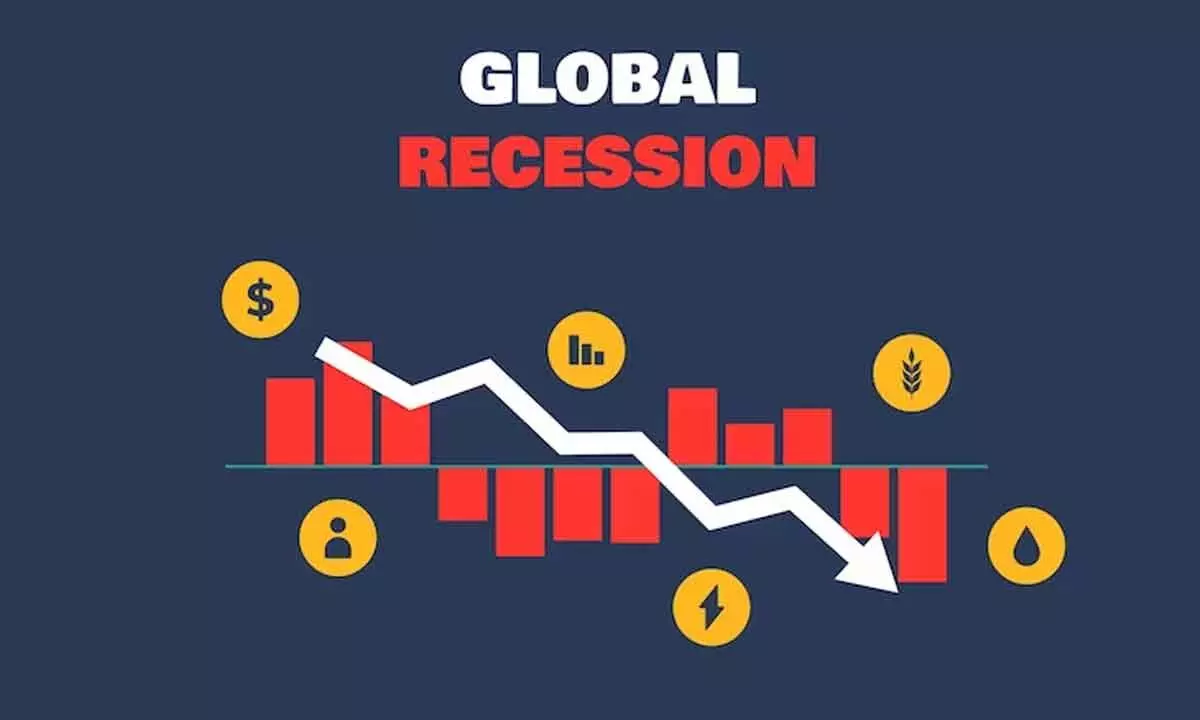India can survive global recession if pushed into by US banking crisis
The recent developments indicate that all is not well in the United States, the world's largest economy
image for illustrative purpose

Murmurs and apprehensions of an impending global recession have been doing the rounds for quite a long time now.Given the backdrop,do the recent developments in the US banking sector portend such a possibility?
On March 10, Silicon Valley Bank (SVB), which is based out of Santa Clara in California and 16th largest bank in the US, collapsed after a bank run. With an asset base of $209 billion, it is the second largest bank failure in the country’s history after the collapse of Washington Mutual ($309 billion) in 2008.
The downfall of 40-year-old SVB is significant as this little known bank has all along been supporting startups around the world. Reports indicate that over 10,000 startups stare a imminent trouble if the bankgoes down the drain. Of course, the US government, which refused to bail out the bank, stepped in to protect depositors, thus providing a huge relief to the harrowed lot. However, the crisis did not stop at SVB.
Two days later, New York-based Signature Bank, which had $118 billion in assets,also failed. As if the sudden failure of the two banks was not enough, San Francisco-based First Republic Bank, which mainly caters to high network individuals (HNIs), landed in a crisis too. The bank has more than $200 billion in assets. Though a consortium of US banks pumped in $30 billion intothe beleaguered bank, it is not out of the woods yet. It should surprise no one if more US banks head towards similar disasters in the days and weeks to come.
Prior to the banking crisis knocking on the doorsteps, many US-headquartered technology giants, including Google, Meta and Microsoft, went on a layoff spree. As per one estimate, the country’s tech industry has firedover 2.34 lakh employees towards the end of 2002, of which 90,000 are this year. The banking crisis and layoffs are a clear indication that all is not well with the US economy even as the US Federal Reserve has gone for interest rate hikes to curb inflationary pressures.
A word of caution from top US economists is that the country's economy will land ina severe recession.
Meanwhile, a larger picture shows that the economic troubles are not restricted to the US alone. The Switzerland-based financial services major Credit Suisse is in throes. A $54-billion lifeline fromthe Swiss central bank did not help the 167-year-old financial giant. That means that the economic health of several European nations is not sound, irrespective of their envious track-record.
In the January 2023 update to its World Economic Outlook (WEO), the International Monetary Fund (IMF) forecast a significant fall in the global growth to 2.9 per cent in 2023 from last year’s high of 3.4 per cent. It, however, did not explicitly mention about a global recession, but said the slowdown would be more pronounced in the developed world. Given the turmoil in the US economy, will it change its track and forecast a global recession in its next update? Many aver so.
Anyway, it looks like dark days are ahead for the global economy.The positive point in this gloomy situation is that central banks have many instruments in their armoury to control the damage and bring back economies on a growth track if there is a recession.
Drawing the debate closer home, one is bound to ask if India is immune to the impending global slowdown.I don't think so. We are living in an interconnected world, which implies that the repercussions will also impact Indian economy, albeit mildly because the country’s growth is largely driven by domestic consumption. Further, the Indian technology sector, which makes a significant contribution to the country's GDP and employment generation, is likely to benefit from this slowdown. Whenever there are economic headwinds, MNCs reduce tech spend and look for low-cost destinations for their technology related projects. There are enough precedents on this count. We have seen it during the 2008 financial meltdown and on earlier occasions also. It will happen this time too as India continues to be the cheapest destination for outsourcing projects as salaries are low compared to the developed world and rupee continues to depreciate.
IMF has stated that India and China will together account for 50 per cent of the global economic growth in 2023. That way, India is set to make a good contribution this calendar year even if there is a fall in growth rate.
One should note that RBI Governor Shaktikanta Das had sounded a cautionary warning last week. Blaming asset-liability mismatches for the US banking crisis, he asked Indian banks to be pragmatically judicious on this front.
As General Elections are round the corner and Prime Minister Narendra Modi is keen on scoring an electoral hat-trick, the second such feat in India's democratic history, any mishandling of the economy at this juncture will cost the saffron party dearly. It's to be seen how the Modi government will handle the economic slowdown if it creeps in.

